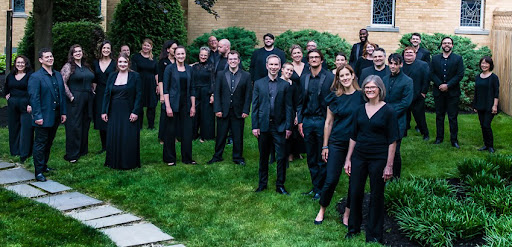by Kevin McLaughlin

Several contemporary composers (Claudia Hinsdale, Jeff Scott, Joshua Estok, Andrew Rindfleisch, and Caroline Shaw) honored old masters — and did themselves honor in return — in a satisfying program of pairings on Saturday, March 2, at the First Lutheran Church of Lorain. Artistic director Gregory Ristow and the exceptional voices of the Cleveland Chamber Choir were their co-travelers in time.
As one of the earliest examples of a composer referencing an older style, Crucifixum in carne (probably by Medieval composer Pérotin, looking back at the anonymous original) served as an appropriate introduction. Here, the old was intertwined with the new as an elongated cantus firmus undergirded fancy new polyphony. Sung by thirteen unaccompanied male voices led by assistant conductor Peter Wright, the piece resonated warmly in the sanctuary.
No sooner had the evocative and mysterious sound world of Gregorio Allegri’s Miserere faded away (made especially lovely by the solo quartet), when 26 singers positioned themselves around the sanctuary to sing Claudia Hinsdale’s reworking of the same text. Joy borrows Allegri’s basic building blocks — chant, snatches of polyphony, even a couple of high C’s — but in fragments, like a dream recalled. Strands of live electronics infiltrated the texture — strangely at first — adding complexity and flavor to the human choir and liberating the new from the old.
A dialogue about the practice of divination linked Stravinsky’s Yule Divinations and Jeff Scott’s Nǐ de mìngyùn, wǒ de mìngyùn (“Your Destiny, My Destiny”), here receiving its world premiere. Both composers set several texts that in some way describe that supernatural practice. Stravinsky’s Russian peasant stories were charming and Scott’s texts — West African, Chinese from I Ching, and self-composed — often struck a personal or emotional chord. By way of introduction, Ristow related his childhood experience about his mother’s practice of astrology. Both works make effective use of a horn quartet — Scott’s own instrument — expertly played by Van Parker, Ben Hottensmith, Rachel Vaduva, and Meredith Evans.
Joshua Estok’s If You Love Me, also a world premiere, lingered in the mind long after its performance — independently of its companion, the equally lovely If Ye Love Me by Thomas Tallis. While Tallis’s meditation on love is more spiritual, Estok’s is decidedly human: “What are the ways in which I would ask someone to love and care for me?” he writes. Imitating Tallis’s musical ethos, the whispered and spoken text penetrated like flashes of light, conveying the urgency of universal human needs: “to take the time to listen, to view me as an equal, to make me feel calm, safe and secure.”
The practice of parody — one composer copying techniques of another as a way to understand — is a time-honored method. Sebastien de Vivanco’s In Manus Tuas was widely published in his lifetime and has evidently been a ripe target for imitation by many composers, including Andrew Rindfleisch, who honored him with his own sincere form of flattery. Rindfleisch held onto the composer’s Renaissance gestures and biblical text (“Into your hands, O Lord, I commend my spirit”), without cribbing melody or harmony. The Chamber Choir made a case for the continued performance of both works.
Caroline Shaw’s To the Hands was a response to Ad manus from Dieterich Buxtehude’s Membra Jesu Nostri, which preceded it on the program. It was difficult not to think about the plight of immigrants and refugees everywhere, but particularly in our own country given recent events. Discourse with Buxtehude was plentiful, but especially poignant was the Prelude, which turned the wordless tune of Ad manus into a wordless plainchant melody.
Shaw converts Buxtehude’s central question, “What are these wounds in the midst of your hands?” to “What are these wounds in the midst of our hands?” The wordless chanting of numbers — data of the displaced — is perhaps the cruelest language of all. As the composer writes, the words of the final section, “ever ever will I hold you, ever ever will I enfold you,” could be “the words of a parent or friend or lover, or even of a nation.”
Published on ClevelandClassical.com March 11, 2024.
Click here for a printable copy of this article


